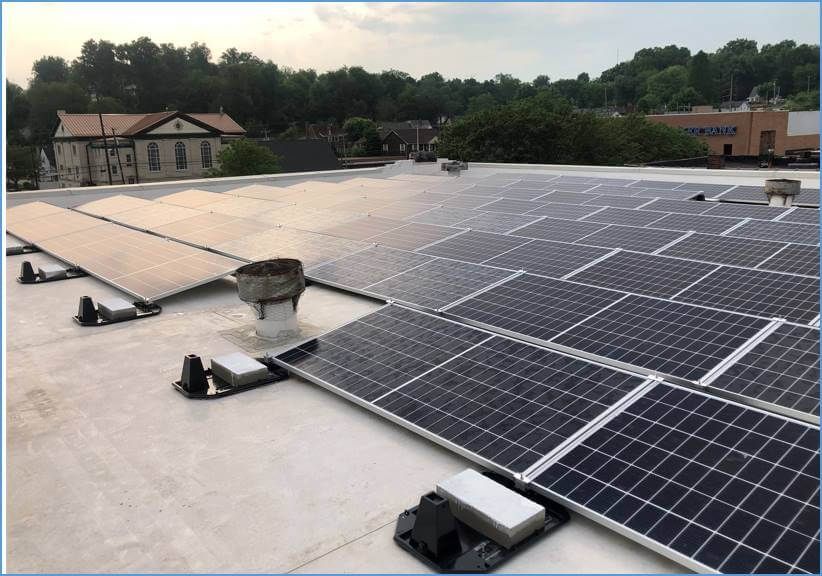Build a brighter future for your community by powering your organization with solar energy! Adding solar panels to your campus can bring big cost savings to your bottom line.
Anchor institutions and large nonprofit organizations, including homeless shelters, educational institutions, medical centers, and faith institutions, can apply for a direct grant sub-award to offset up to 20% of total project cost from the Appalachian Solar Finance Fund to build your next solar project. The SFF also supports roof repair funding for buildings needing cost assistance for pre-solar roof maintenance or replacement – up to 20% of the total cost of roof repair, up to $20,000 per project.
Commercial businesses that are acting as anchor institutions to address social needs and generate community-based benefits can also qualify for solar project assistance. Apply to the Appalachian Solar Finance Fund for predevelopment technical assistance cost support and credit enhancements to get a project off the ground. This can help your business access larger federal grants and serve as a guiding partner to get the job done!
Get inspired! How could these solar projects help your community?
- Enjoy long-term energy cost savings
- Hedge against rising utility costs
- Build climate resilience
- Meet organizational sustainability goals
- Be a local renewable energy leader
SFF can help make your solar power dream a reality!
If you have a BIG dream, let us know! The SFF can help unlock funding and financing opportunities for high-need, high-impact solar projects in coal-impacted communities throughout Central Appalachia.
In addition to direct project funding, the SFF has built a solution to cover a short-term solar financing need created by the 2022 federal Inflation Reduction Act (IRA). The IRA has established for the first time a direct payment option to allow tax-exempt entities to access the value of the federal energy Investment Tax Credit (ITC). This tax credit offsets 30% or more of a solar project’s total cost! It’s great news for public institutions and nonprofits seeking to go solar. But it also means that many public institutions and nonprofits may need short-term bridge financing to cover the time gap between a solar project’s construction and the federal government’s eventual remittance of the ITC.
The SFF can help support these emerging solar financing needs of adding solar panels to your campus by providing short-term low- to zero-interest bridge loans for impactful solar projects via our partner organization Invest Appalachia (IA). The SFF also can award sub-grants to offset interest and fees accrued on ITC bridge loans issued by traditional lenders for public and nonprofit solar projects.
Moreover, the SFF and IA have developed a flexible suite of solar credit enhancements, including interest-rate buydowns and loan guarantees, to help leverage large-scale repayable investment into promising solar projects that face financing obstacles related to risk migration, cost of capital, or timing of investment. These innovative financial tools are designed to absorb risk and/or cost to help secure the overall capital stack for an impactful project.
Apply for funding support for your solar project
With so many funding and financing solutions, why not dream up a solar project for your community today? The SFF accepts applications on a rolling basis. Get all the details here.
GRANTEE HIGHLIGHT
Moonbow at 2nd & Main is a premier community event space with boutique gallery and lodging in Corbin, KY. The Appalachian Solar Finance Fund provided over $6,000 in technical assistance cost support, and Moonbow also earned $17,000 in USDA Rural Energy for America Program (REAP) grant funding for a new solar installation. The 27-kilowatt rooftop solar array was installed by Johnathan Gambrel, owner of local solar company Solar Energy Living, in 2022. Moonbow’s solar installation is projected to save $113,640 in energy costs over the system’s lifetime.
The space’s shift to solar not only helps cut energy costs for a community pillar, but also sets the stage for a more sustainable future for Corbin’s environment and residents.
“You can count me as a solar evangelist if any other business owners in the region are interested in installing solar,” says Moonbow owner Geoff Marietta.


